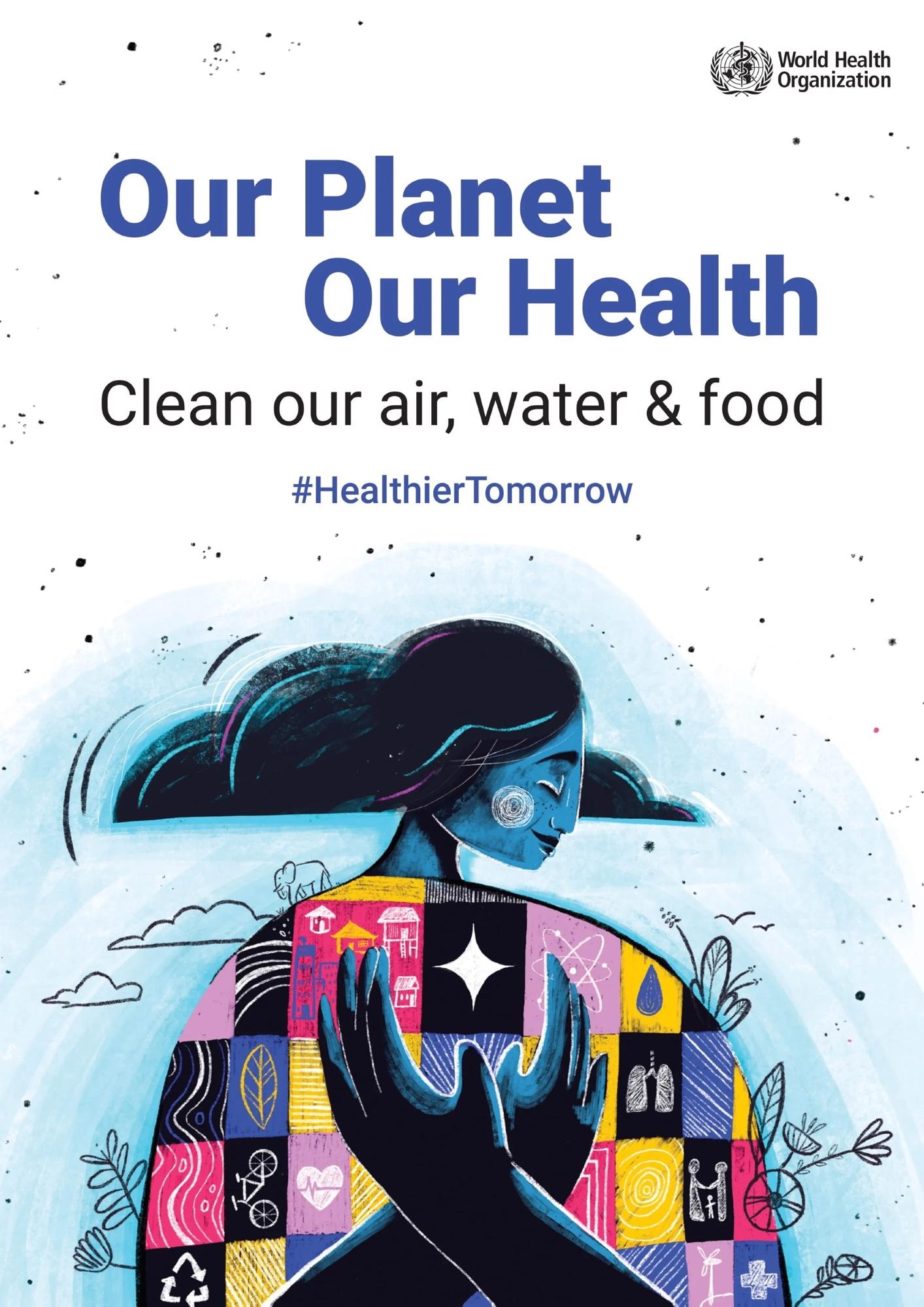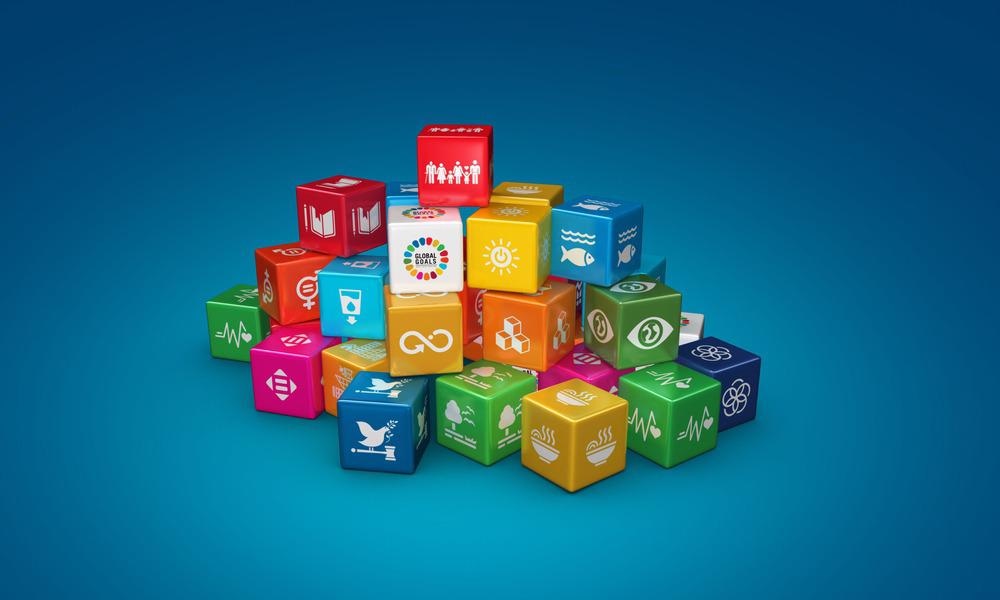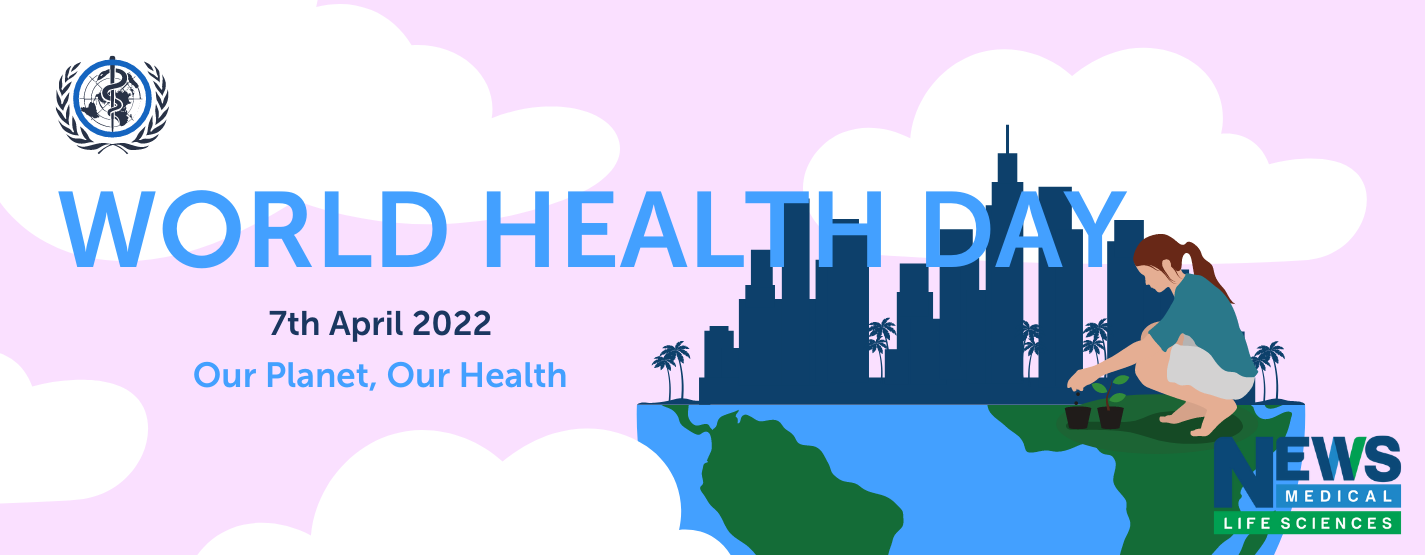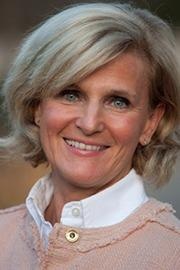I am Dr. Maria Neira, and I am the director of the Department of Environment, Climate Change and Health at the World Health Organization. As a medical doctor by training, I specialized in endocrinology, then I did a Master’s in public health. Since then, I have been in public health for many years and it has become my passion.
Every year the world celebrates World Health Day on the 7th of April. Why is it important to help raise awareness surrounding global health and the inequalities that millions of people face worldwide?
Obviously, we should dedicate the whole year to promoting people's health. But for one day of the year, the 7th of April, we select one thing, and we try to promote it and make sure that over the year, people keep talking about that, raising awareness and hopefully influencing others about it.
So, this year the subject is very much in line with every political and social agenda: our planet, our health, and how we need a healthy environment if we want healthy people. We are very much committed and we hope that we will have a lot of young people behind us making sure that this will contribute to living a little bit better in the world that we have today.
Our planet, our health - World Health Day 2022
This year the theme for World Health Day is ‘Our planet, our health’. What does this message mean to you, and what is the relationship between our own personal health and that of the planet?
The idea is very simple. The idea is to first make sure that everybody understands the connections and links between the environment and health. If you pollute your environment, if you pollute the water you drink, the air you breathe, the food you eat, you are destroying the basis of your health that is coming from nature and you have little chance of good health. The most powerful message of this theme is a call for people to understand how much it is connected - the health of the planet and the health of the people.
Second, the idea is to be positive, to try to mobilize people to say, okay, what I can do as an individual at home, or at the household level? What can I do with my vote, to influence the decisions of policymakers, mayors, or governments? And how can I as an individual, as a member of society, as a teacher, as a medical doctor, as an engineer, as anyone in society, how can I contribute? How can I contribute as a mother or a father? What can I do to make sure that we have more strategic and wise decision-making regarding nature, which is providing us with all we need for our health today?
Climate change is not just a planetary crisis, but also a human health crisis. How is our changing planet affecting the health of the individuals living in it?
If you look at the causes of climate change, one prominent cause is the combustion of fossil fuels. The combustion of fossil fuels and the fact that we are still using those fossil fuels as sources of energy is contributing to our health in a very negative way.
Look at the air pollution that is responsible for 7 million premature deaths every year. In addition to the 7 million premature deaths, there is a lot of suffering from chronic diseases, from asthma, and lung cancer, affecting almost all the organs in our body. I think people need to make that connection: by tackling the causes of climate change, you will be tackling and reducing the cause of air pollution and therefore contributing to generating better health. Similarly, you can do this by regulating traffic, regulating the way you incinerate, regulating industrial processes, and changing commuting and transport.
If we change all of that in a very strategic and common sense-based way, the benefits for our health will be enormous. Tackling the causes of climate change and the costs of what we are spending in our health systems to treat diseases caused by the wrong choices that we are having as a society will be fantastically reduced.
This is the moment to make the right decision because we need to ensure a healthy and green recovery after the COVID-19 pandemic and after the humanitarian war crisis that we are suffering through now.

Image Credit: World Health Organization
A large part of your campaign is focusing on keeping the planet healthy and creating ‘well-being societies’. What is meant by the term ‘wellbeing society’, and what benefits would this have for the future of global health?
Essentially, a well-being society is one where you apply the basic principles of public health. Public health is about making decisions for a population and making sure that they will have better conditions to make healthy choices.
If you are living in a city that is very polluted, there are very limited options to breathe air that will not affect your health negatively. If you live in a city where you cannot buy anything other than processed food, in a city where you cannot walk and are forced to have a sedentary lifestyle, that is not contributing to your wellbeing.
The idea is to create a society where those healthy choices can be taken. You can choose whether you have a sedentary lifestyle or a very active one. You can choose to have food that is produced locally with fewer pesticides, forming a healthy diet. And that will be very good for our economy as well. It is not just health and wellbeing, it is also about the recovery of our economy in a more sustainable way.
Your featured hashtag (#HealthierTomorrow) is allowing people worldwide to support your campaign and show the steps they are taking to protect their health and the planet’s. How important is social media as a tool for raising awareness of important topics such as health inequalities?
I think that today, doing something without the use of social media is likely to lead to failure. We need social media. We need people convinced about these very simple messages.
And we want to share this message with everyone: from a nurse in a very remote area in Africa to a nurse in a very well developed country; from children to teachers, to doctors, to mothers, to fathers... we want everyone to read our message and think, what can I do? How can I, at home, change the way I am recycling, take public transport instead of a car, or teach my children the correct way to use plastic? How can I make an association with my neighbors and start to pass on this message, change my vote, or create a movement?
Everyone has a role to play and no one should underestimate this. Of course, our governments need to change things on a global scale, but is our contribution, our action, the one that might influence the way our governments will behave?
We are currently living in a digital age where millions of people worldwide use social media to communicate daily, as the pandemic has highlighted. However, it can also fuel the spread of potentially dangerous medical misinformation. What impact can the spread of misinformation have on the public, and what is the WHO trying to do to promote reliable and accurate information?
At the WHO, we have experienced this misinformation and how damaging this misinformation can be during the pandemic. That is why our call is for people to always consult. They should be free on the information - everybody has the right to communicate, but use at least one source of reliable information.
If you want to challenge the information you are receiving, use at least one or two reliable sources so that you can make your own decisions. We try to be friendly in our communication, reaching everyone and targeting all types of people within society to make sure that the message will be simple and universal.
Regarding a healthy planet and healthy people, I think the message is about it being very close to us. It is not about polar bears, glaciers, or planets, it is about your lands. Connect the fact that whatever happens to the environment is happening to your lungs, your cardiovascular system, your neurological system, and your body. The moment you make that connection, you will be an agent of change wherever you live, whatever you do, and however old you are. Everyone can contribute.

Image Credit: MintBlanc/Shutterstock.com
The sustainable development goals (SDGs) have also highlighted the importance of inequalities worldwide as some of the 17 goals include; ‘No Poverty’, ‘Zero Hunger’, ‘Good Health and Well-Being’, as well as ‘Gender Equality’ and ‘Reduced Inequalities’. How do your missions at the WHO align with some of the SDGs, and how can countries align their SDGs strategies with those aiming to improve global health?
Well, this is a critical moment for that as we are trying to recover after the pandemic. Governments are now mobilizing important financial support for this recovery. So some decisions will be taken on how to invest that money. And I think that through our manifesto, we gave prescriptions for a healthy, green, and fair recovery. And all of them are win-win situations.
The first one is to stop destroying nature, as this is a way to recover. It is good for health, but it is also good for the economy, and it is good for reducing inequities.
Second, we need to close the horrible gap that we still have in terms of access to clean water, sanitation, and electricity for almost half of the world's population. We are telling people to wash their hands as one of the key principles for preventing the spread of coronavirus, but for many people around the world, it is not possible to wash their hands. They do not have access to water, soap, and basic hygiene. We need to take advantage of the current situation to close this gap. That will reduce the enormous inequities that we have at the moment that are particularly affecting very vulnerable, low-income communities.
Thirdly, we need to transition to healthy energy sources. Fossil fuel combustion is literally killing us. We need to transition to renewables or clean sources of energy (sustainable development goal 7) and we need to rethink our cities to make them more livable. We need to stop giving subsidies to fossil fuels, and we need to transform our food systems, changing to more sustainable food production and consumption.
If you put these prescriptions together, you come out with the 17 sustainable development goals. It is all common sense really and about intelligence as a society. It will be good for human health, the environment, and the economy, and it will be fantastically good to reduce all of those inequities that we are seeing so dramatically at the moment.
With so much information available worldwide on what people can do to improve the health of our planet, what would your advice be to someone who wants to get involved?
First, start at home. Look around and see what you can do. Maybe you can reduce all the chemicals that you have at home. You will be surprised to look at the number of products that we have for cleaning, washing, cosmetics, and many of them are probably not necessary. Look at the amount of plastic you have around which is unnecessary. Try to reduce your plastic usage. Look at the way you recycle at home, look at the way you package your food, and look where you buy your food. Maybe you can reduce your carbon footprint.
Maybe you should take out your old bicycle and start to use it again instead of your car. Leave your house and look at the working environment, or the school environment, or your friend’s environment, at a university, wherever. Look at what you can do in addition to your individual actions and start to convince others and spread the message. This has to be very contagious. This is a virus that we should be spreading everywhere because it is a positive one.
And an important thing. Use your vote. Do not forget that you are a citizen and you have something very powerful, which is your vote. Make sure that when you vote, you vote for those who will be taking action in this sense, and you can have your influence. All of us together have an enormous influence on selecting and choosing the major people in our government. So make sure that is the case.

The COVID-19 pandemic has highlighted that when companies, organizations, and institutions all work together, incredible scientific advancements can be made. However, with this, it has also highlighted the many inequalities that are still faced by millions worldwide. How can we use lessons learned from the pandemic to help improve global health?
I think the corporates within the private sector need to be part of this. And that will depend very much on the pressure we put on them as a consumer. Things are changing. Big companies are now all talking. Sometimes it is just a greenwash, but at least they are trying to do something to reduce their own carbon footprint, to reduce their use of plastic, to make a difference. They are doing this because they know that the consumers are asking for it. So it proves that as consumers, we can influence all of that.
I invite everyone to reflect on how they can influence the way those big companies operate. How can you put more pressure on them, because if we maintain that pressure, if we monitor, if we scrutinize, if we use our social media power as well, we can have very positive outcomes, even if companies carry out a greenwash.
Our global health will depend on the decisions that the energy sector, the trade sector, the transport sector, and all the private companies take. We need to be aware of all of that and use our power as the consumer.
Are you hopeful that with continued awareness surrounding healthcare inequalities, we will start to see a more fair and equal world? What would this look like to you?
If I was not a pathologically optimistic person, I would not be working in public health. So yes, I am hopeful, because I see the young people demonstrating on the streets. And I think that it is the first time in history where we have very young people demonstrating instead of having old people with a certain political position weighing in.
Seeing people taking action gives me a lot of hope because when people start fighting for their health, it is irreversible. The question is how much time it will take to enact change, but I am convinced that now we are not going back. We need to accelerate forward and it will depend so much on the young people, the youth. I am sure that they will do it.
Have you got anything else you wanted to add?
Just inviting everybody to join. Please join, join, join. Be very active, be very positive. Try to convince people and do not look back. Look only forward.
Where can readers find more information?
Let me take this opportunity to bring your attention to the upcoming World Health Day 2022 (April 7) themed around "Our Planet, Our Health" and various related materials in case they might be of interest to you : https://www.who.int/campaigns/world-health-day/2022
About Dr. Maria Neira
Dr Maria P. Neira has been directing the Department of Environment, Climate Change and Health at the World Health Organization, Geneva, Switzerland since September 2005. Throughout her tenure and up until now she has led and advised on policy and management in key areas of environmental health.
Prior to that she served as Under-Secretary of Health and President of the Spanish Food Safety Agency. 
From 1993-1998 she was Coordinator of the Global Task Force on Cholera Control.
Dr Neira began her career as a medical coordinator working with refugees in El Salvador and Honduras for Médecins Sans Frontières (Doctors Without Borders). She then spent several years working in different African countries during armed conflicts.
Born in the city of Oviedo, Asturias, Dr Neira is a Spanish national, a medical doctor by training and specialized in Endocrinology and Metabolic Diseases; and Public Health.
Among many distinctions, she has been awarded the Médaille de l'Ordre national du Mérite by the Government of France and received an “Extraordinary Woman” award by HM Queen Letizia of Spain. In early 2019, she was nominated among the top 100 policy influencers in health and climate change.